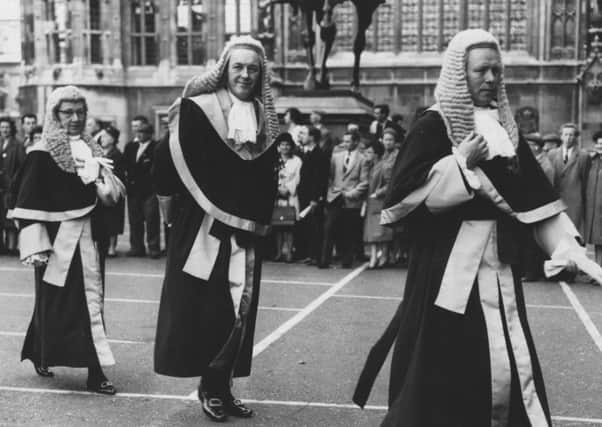On this day: Elizabeth Lane made female High Court judge


National day of Botswana.
1659: According to the author Daniel Defoe, Robinson Crusoe – a character based on the Largo mariner Alexander Selkirk – was shipwrecked.
1791: Mozart’s opera The Magic Flute was first performed in Vienna.
Advertisement
Hide AdAdvertisement
Hide Ad1808: The Theatre Royal in Covent Garden was destroyed by fire.
1868: Queen Isabella of Spain was deposed and fled to France.
1885: Bechuanaland became a British protectorate.
1887: The US boat “Volunteer” defeated Scotland’s “Thistle” in the America’s Cup.
1902: Artificial silk was first patented, as “rayon”.
1911: World’s first flying stuntman, Lieutenant HH Arnold, performed flying sequence in The Military Air Scout in New York.
1922: Benito Mussolini formed first Fascist government in Italy.
1927: Baseball legend Babe Ruth struck his record-setting 60th home run to secure victory for the New York Yankees against the Washington Senators.
1928: Discovery of penicillin by Ayrshire-born Sir Alexander Fleming was announced.
1928: Leon Vanderstuyft of Belgium cycled a record 76 miles 604 yards in 1 hr.
1929: BBC made the first experimental television broadcast.
Advertisement
Hide AdAdvertisement
Hide Ad1935: The Hoover Dam, situated astride the border between the US states of Arizona and Nevada, was dedicated by President Franklin D Roosevelt.
1936: Pinewood Studios opened near Iver, Buckinghamshire.
1938: On his return from Munich Prime Minister Neville Chamberlain told a crowd at Heston Airport, London: “I believe it is peace in our time.”
1939: Pact agreeing on partition of Poland was signed by Germany and USSR.
1939: A British Expeditionary Force of 158,000 men was sent to France.
1946: International military tribunal in Nuremberg, Germany, found 22 Nazi leaders guilty of war crimes. Eleven were sentenced to death.
1949: The Berlin Airlift, an operation by British and American aircraft to bring in food and supplies to beat the blockade of the city by Russian troops, ended after 277,000 flights.
1958: French Guinee became the independent republic of Guinea.
1958: Soviet Union resumed nuclear testing.
1965: Judge Elizabeth Lane was sworn in to become Britain’s first female High Court judge.
1966: Lord Thomson of Fleet bought the Times newspaper.
Advertisement
Hide AdAdvertisement
Hide Ad1966: Botswana (formerly Bechuanaland) gained independence from Britain.
1967: BBC’s Radio 1 went on the air for the first time.
1971: United States and Soviet Union signed pacts designed to avoid accidental nuclear war.
1992: A new, smaller and lighter 10p coin was introduced in Britain.
1994: Aldwych tube station (originally Strand Station) of the London Underground closed after 88 years’ service.
1999: Japan’s second worst nuclear accident occurred at a uranium reprocessing facility in Tokai-mura, north-east of Tokyo.
2005: Controversial drawings of the Prophet were printed in Danish newspaper Jyllands-Posten.
2009: An earthquake in Sumatra killed more than 1,100 people.
ANNIVERSARIES
Births: 1881 Hans Geiger, German scientist and joint inventor of the Geiger counter; 1917 Buddy Rich, drummer and bandleader; 1921 Deborah Kerr, Helensburgh-born actress; 1924 Truman Capote, author; 1947 Marc Bolan, glam rock star; 1952 Jack Wild, actor (Oliver!).
Advertisement
Hide AdAdvertisement
Hide AdDeaths: 1772 James Brindley, canal engineer; 1948 Edith Roosevelt, US first lady; 1955 James Dean, actor; 1985 Charles Richter, seismologist; 1985 Simone Signoret, actress; 1998 Gordon Richards, racehorse trainer.